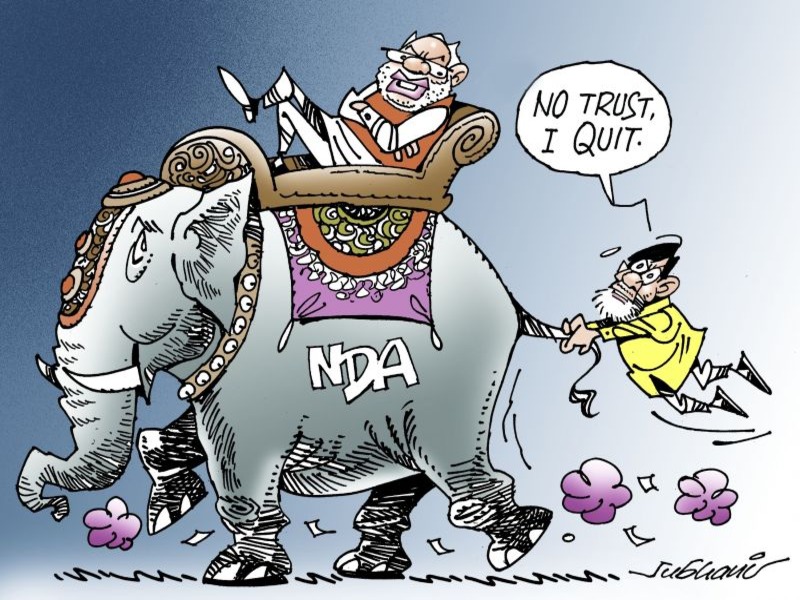Will Chandrababu Naidu’s past grievances with the BJP lead him to play ‘revenge politics’ within the NDA? Exploring historical tensions, political strategies, and recent moves, this analysis delves into whether Naidu’s actions will be driven by retribution or pragmatism as he navigates the complex landscape of Indian politics.
Nara Chandrababu Naidu, a seasoned Indian politician, has had a significant influence on the political landscape of Andhra Pradesh and, by extension, national politics. As the leader of the Telugu Desam Party (TDP), his political maneuvers have often been keenly watched, especially in his interactions with the National Democratic Alliance (NDA). The question of whether Naidu will play ‘revenge politics’ in the NDA is a topic of much speculation and analysis.
Historical Context
To understand the potential for ‘revenge politics,’ it is essential to look at the historical context of Naidu’s relationship with the NDA. The TDP has had a fluctuating relationship with the NDA over the years. Naidu initially supported the NDA under the leadership of Atal Bihari Vajpayee, contributing to the coalition’s stability and governance. However, the relationship soured, and in 2018, Naidu withdrew from the NDA, citing the BJP’s failure to grant special category status to Andhra Pradesh, a promise made during the state’s bifurcation.
Reasons for Potential ‘Revenge Politics’
- Bifurcation of Andhra Pradesh: The bifurcation of Andhra Pradesh in 2014 was a significant event that left lingering bitterness among the state’s populace. Naidu has often accused the BJP.
- Unfulfilled Promises: The BJP’s failure to grant special category status and fulfill other promises made during Andhra Pradesh’s bifurcation remains a significant grievance for Naidu and his supporters.
- Political Marginalization: Naidu’s TDP has faced political isolation since leaving the NDA, with the BJP appearing to favor his rival, Y.S. Jagan Mohan Reddy, and the YSR Congress Party.
- Electoral Strategy: As a seasoned strategist, Naidu may see opposing the NDA as a way to consolidate anti-BJP sentiment, strengthen his political base, and regain relevance.
- Personal and Political Dynamics: Strained personal relationships with BJP leaders and evolving internal dynamics within the TDP could also fuel Naidu’s motivation to seek retribution.
Potential Gains for Naidu from Revenge Politics
- Political Leverage: By taking a strong stance against the BJP, Naidu could gain leverage to negotiate better terms for his party and Andhra Pradesh, including more favorable policies and financial support.
- Consolidation of Support Base: Playing revenge politics could help Naidu consolidate his support base by appealing to voters dissatisfied with the BJP and its handling of Andhra Pradesh’s issues.
- Increased Visibility: Opposing a major national party like the BJP can elevate Naidu’s profile both within the state and nationally, positioning him as a key player in the opposition.
- Strategic Alliances: Revenge politics might facilitate alliances with other opposition parties that share grievances against the BJP, thereby strengthening Naidu’s political network and influence.
- Electoral Gains: By positioning himself as a staunch opponent of the BJP, Naidu could attract votes from segments of the electorate that are looking for an alternative to the ruling party, potentially improving his party’s performance in future elections.
- Political Narrative: Naidu can craft a narrative of standing up against perceived injustices and broken promises by the BJP, which can resonate with voters who feel similarly aggrieved.
However, engaging in revenge politics also carries risks, such as increased polarization and potential backlash from voters who favor more collaborative approaches. Naidu will need to carefully balance these potential gains against the possible downsides.
Solutions for Revenge Politics
- Dialogue and Reconciliation: Open communication channels between political parties can help address grievances and build mutual understanding. Regular dialogues can reduce animosities and foster a collaborative atmosphere.
- Policy Concessions: Addressing key issues like special category status for Andhra Pradesh and fulfilling bifurcation promises can mitigate resentment. Concessions and tangible benefits can transform adversarial relationships into cooperative ones.
- Strategic Alliances: Forming strategic alliances based on common goals rather than past grievances can shift the focus from revenge to constructive collaboration. Building coalitions around shared interests can promote stability.
- Inclusive Governance: Implementing inclusive policies that consider the needs and aspirations of all stakeholders can reduce feelings of marginalization. Ensuring fair representation and benefits can create a more harmonious political environment.
- Conflict Resolution Mechanisms: Establishing formal mechanisms for conflict resolution within political frameworks can provide structured ways to address disputes. This can prevent the escalation of disagreements into revenge politics.
- Promoting Political Ethics: Encouraging a culture of political ethics and responsibility can deter revenge politics. Promoting values like respect, integrity, and accountability can lead to healthier political interactions.
- Public Engagement: Involving the public in political processes and decision-making can foster transparency and trust. Public support for constructive politics can pressure leaders to avoid revenge-based actions.
- Leadership Mediation: Senior political leaders and respected figures can mediate conflicts and facilitate understanding. Their involvement can lend credibility to reconciliation efforts and encourage compromise.
Implementing these solutions requires commitment and effort from all political stakeholders. Focusing on common goals, mutual respect, and constructive engagement can pave the way for more positive and productive politics. #hydkhabar

